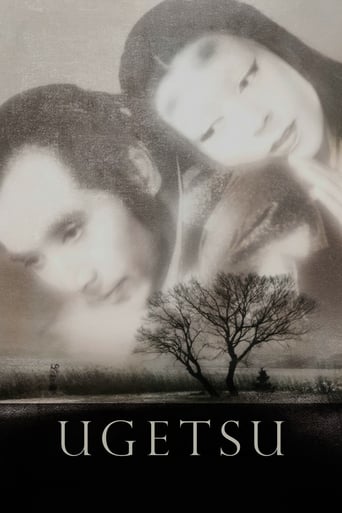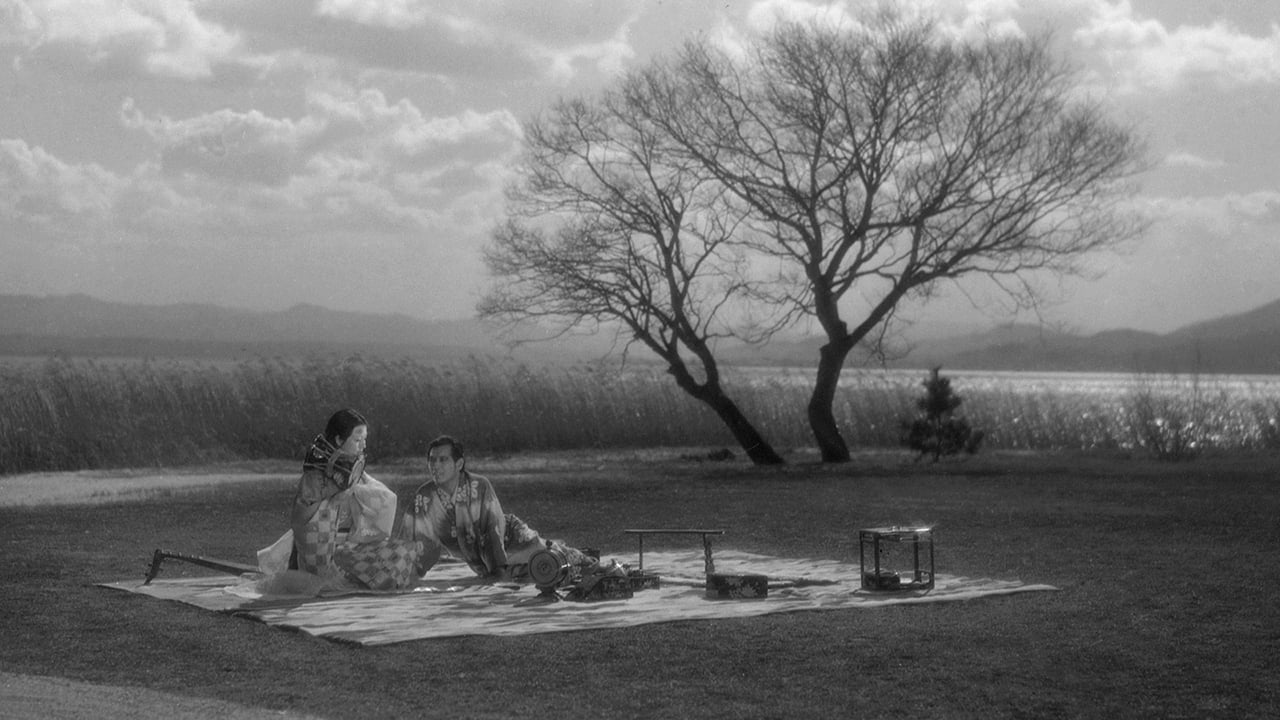poe-48833
UGETSU offers the viewer TWO stories for the price of one: a ghost story and a tale of ambition gone wrong. When warring factions overrun the countryside and destroy his farm and his successful pottery business, Genjuro strikes out in search of Fortune with his wife and son in tow (despite an earlier observation that "war is good for Business," the American mantra). They are accompanied by Tobei, whose desire is to become a great Samurai, and his wife. The two men part from their families at one point, vowing to return. Genjuro becomes involved with a mysterious woman who turns out to be a Spirit haunting the land, marrying her in a fit of passion and more or less renouncing his family. Meanwhile, his wife is speared by some of the starving samurai pillaging the land and his son is adopted by a kindly villager. From hiding, Tobei sees a Samurai general allow his head to be taken by a foot soldier; he then spears the soldier from ambush and, taking the head, presents it as a trophy to one of the enemy Samurai generals. He is granted his wish and becomes a Samurai. His wife, meanwhile, has been raped and has fallen into prostitution just to survive. The story ends by coming full circle, and the closing comment is appropriate: "Such is the way of the World." Unlike most anthologies, only one of UGETSU's two stories deals in any way with the Supernatural; the other is strictly "mainstream" in its approach. The thread that binds them is the overriding philosophy (best summed up by the aforementioned closing line). And, as ever, the women don't fare very well at all in this Mizoguchi masterpiece.
Anssi Vartiainen
Ugetsu, or Ugetsu monogatari, took the world by storm when it was released in the 50s, helping to popularize Japanese cinema in the West. Even nowadays it is hailed as one of the best to come out of Japan. It tells the story of two families that try to seek their fortunes while a war rages near their lands. Its messages are those of knowing your place, not extending your reach, avoiding the temptations of glory and flesh, the safety of home and most importantly the fact that sometimes the past and the afterlife are not yet ready to leave this world.It's a multilayered story, focusing mostly on the husbands of the two families, as they travel to a distant marketplace in the midst of war in order to sell their pottery. Along the way they both face struggles and temptations that delay their return home. The contrast rises from the fact that whereas one of them is lead astray by his own need for glory, the other is seduced by a source he had no way of anticipating. Likewise the two wives deal with the missing of their husbands in very different manners, creating contrast.The reason why I haven't ranked this movie any higher is because I have slight problems with Japanese live action cinema in general. More accurately with its pacing. Ugetsu is a slow film. Its tone is also surprisingly flat, which is another thing I've often noticed in Japanese films. It's a cultural thing, I have no doubt about it, but the fact still remains that I have problems identifying with any of the characters or the events because they're all performed with minimal emotions. Horrible things happen, but the expressions on the people's faces hardly change. Or, when the characters finally show any emotions, they overact. Most of the emotions have to be read from the context or from the dialogue. This stems from the heavy traditions of Japanese theatre, and while I respect it, I simply don't like it.Ugetsu is an artistic film. It has heavy, deeply layered themes, archetypical plot and characters struggling against their fates. Definitely worth checking out if you're looking for a deeper movie experience. Personally I don't like it all that much, but I have a lot of respect for it.
Andres Salama
When this ghost story set in Japan's medieval era won the top prize at the Venice film festival in 1953, it showed the rest of the world that Rashomon was no fluke, and that something extraordinary was happening in Japanese cinema. Today we can see that Japanese movies during the 1950s are one of the highlights of the history of cinema, with directors like Kurosawa, Ozu, Mizoguchi and Naruse actively working (sometimes making several movies a year) as well as slightly lesser accomplished directors (Ichikawa, Masumura, Kobayashi, Kinagasa or Oshima and Imamura just starting their respective careers)Ugetsu was widely regarded as among the best films ever made during the 1960s and 1970s. Its reputation has slightly fallen since then, and many people consider now that Mizoguchi made better movies. Using the director's characteristic long takes, it is heavy going at times, especially in the middle section. But it has wonderful scenes, like the one with the trip by boat in a foggy night. It is a movie that any serious cinema buff should see.With Masayuki Mori, Machiko Kyo (they were respectively the samurai and his wife in Rashomon) and Kinuyo Tanaka, among others.
gavin6942
A fantastic tale of war, love, family and ambition set in the midst of the Japanese Civil Wars of the sixteenth century.Along with Akira Kurosawa's 1950 film "Rashomon", "Ugetsu" is credited with having popularized Japanese cinema in the West. And you can see why, with this strong, sweeping tale of a family struggling in the middle of war. The plot is almost epic (albeit brief), and the film ranges from the greatest joys to the worst sorrows within a short time.Donald Richie called it "one of the most perfect movies in the history of Japanese cinema" and especially praised the beauty and morality of the film's opening and closing shots. He is quite right, and this film really explains how important cinematography can be.


 AD
AD




